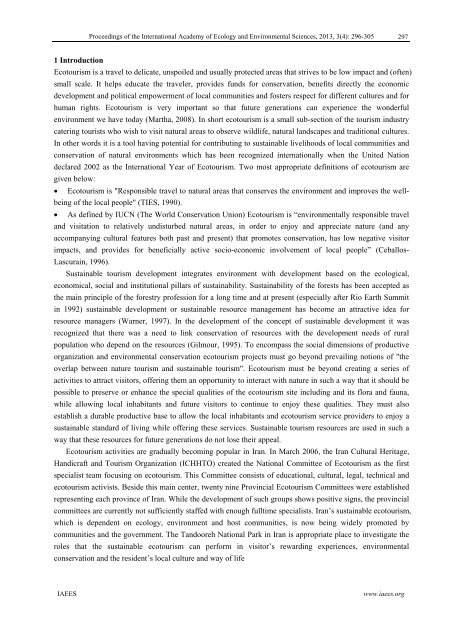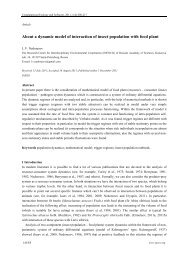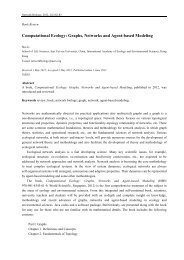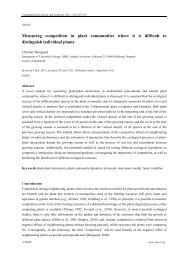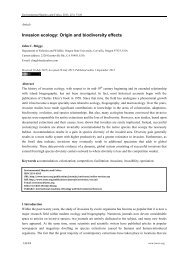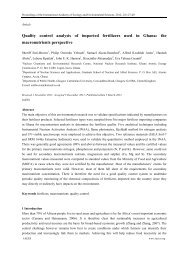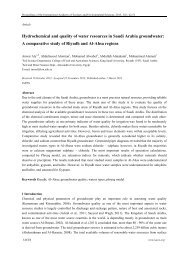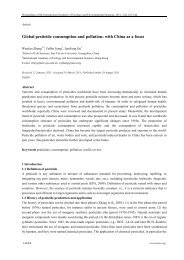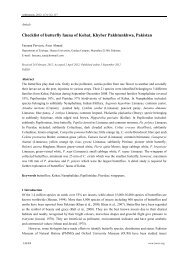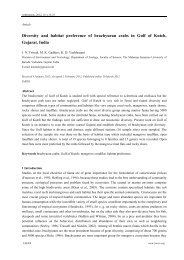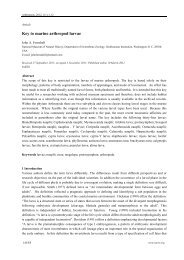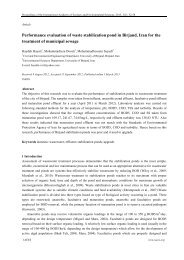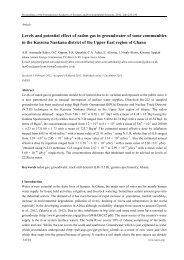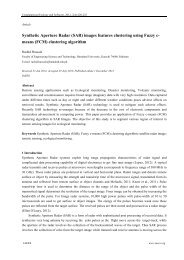SWOT analysis of Tandooreh National Park (NE Iran) for sustainable ...
SWOT analysis of Tandooreh National Park (NE Iran) for sustainable ...
SWOT analysis of Tandooreh National Park (NE Iran) for sustainable ...
Create successful ePaper yourself
Turn your PDF publications into a flip-book with our unique Google optimized e-Paper software.
Proceedings <strong>of</strong> the International Academy <strong>of</strong> Ecology and Environmental Sciences, 2013, 3(4): 296-305<br />
297<br />
1 Introduction<br />
Ecotourism is a travel to delicate, unspoiled and usually protected areas that strives to be low impact and (<strong>of</strong>ten)<br />
small scale. It helps educate the traveler, provides funds <strong>for</strong> conservation, benefits directly the economic<br />
development and political empowerment <strong>of</strong> local communities and fosters respect <strong>for</strong> different cultures and <strong>for</strong><br />
human rights. Ecotourism is very important so that future generations can experience the wonderful<br />
environment we have today (Martha, 2008). In short ecotourism is a small sub-section <strong>of</strong> the tourism industry<br />
catering tourists who wish to visit natural areas to observe wildlife, natural landscapes and traditional cultures.<br />
In other words it is a tool having potential <strong>for</strong> contributing to <strong>sustainable</strong> livelihoods <strong>of</strong> local communities and<br />
conservation <strong>of</strong> natural environments which has been recognized internationally when the United Nation<br />
declared 2002 as the International Year <strong>of</strong> Ecotourism. Two most appropriate definitions <strong>of</strong> ecotourism are<br />
given below:<br />
Ecotourism is "Responsible travel to natural areas that conserves the environment and improves the wellbeing<br />
<strong>of</strong> the local people" (TIES, 1990).<br />
As defined by IUCN (The World Conservation Union) Ecotourism is “environmentally responsible travel<br />
and visitation to relatively undisturbed natural areas, in order to enjoy and appreciate nature (and any<br />
accompanying cultural features both past and present) that promotes conservation, has low negative visitor<br />
impacts, and provides <strong>for</strong> beneficially active socio-economic involvement <strong>of</strong> local people” (Ceballos-<br />
Lascurain, 1996).<br />
Sustainable tourism development integrates environment with development based on the ecological,<br />
economical, social and institutional pillars <strong>of</strong> sustainability. Sustainability <strong>of</strong> the <strong>for</strong>ests has been accepted as<br />
the main principle <strong>of</strong> the <strong>for</strong>estry pr<strong>of</strong>ession <strong>for</strong> a long time and at present (especially after Rio Earth Summit<br />
in 1992) <strong>sustainable</strong> development or <strong>sustainable</strong> resource management has become an attractive idea <strong>for</strong><br />
resource managers (Warner, 1997). In the development <strong>of</strong> the concept <strong>of</strong> <strong>sustainable</strong> development it was<br />
recognized that there was a need to link conservation <strong>of</strong> resources with the development needs <strong>of</strong> rural<br />
population who depend on the resources (Gilmour, 1995). To encompass the social dimensions <strong>of</strong> productive<br />
organization and environmental conservation ecotourism projects must go beyond prevailing notions <strong>of</strong> "the<br />
overlap between nature tourism and <strong>sustainable</strong> tourism". Ecotourism must be beyond creating a series <strong>of</strong><br />
activities to attract visitors, <strong>of</strong>fering them an opportunity to interact with nature in such a way that it should be<br />
possible to preserve or enhance the special qualities <strong>of</strong> the ecotourism site including and its flora and fauna,<br />
while allowing local inhabitants and future visitors to continue to enjoy these qualities. They must also<br />
establish a durable productive base to allow the local inhabitants and ecotourism service providers to enjoy a<br />
<strong>sustainable</strong> standard <strong>of</strong> living while <strong>of</strong>fering these services. Sustainable tourism resources are used in such a<br />
way that these resources <strong>for</strong> future generations do not lose their appeal.<br />
Ecotourism activities are gradually becoming popular in <strong>Iran</strong>. In March 2006, the <strong>Iran</strong> Cultural Heritage,<br />
Handicraft and Tourism Organization (ICHHTO) created the <strong>National</strong> Committee <strong>of</strong> Ecotourism as the first<br />
specialist team focusing on ecotourism. This Committee consists <strong>of</strong> educational, cultural, legal, technical and<br />
ecotourism activists. Beside this main center, twenty nine Provincial Ecotourism Committees were established<br />
representing each province <strong>of</strong> <strong>Iran</strong>. While the development <strong>of</strong> such groups shows positive signs, the provincial<br />
committees are currently not sufficiently staffed with enough fulltime specialists. <strong>Iran</strong>’s <strong>sustainable</strong> ecotourism,<br />
which is dependent on ecology, environment and host communities, is now being widely promoted by<br />
communities and the government. The <strong>Tandooreh</strong> <strong>National</strong> <strong>Park</strong> in <strong>Iran</strong> is appropriate place to investigate the<br />
roles that the <strong>sustainable</strong> ecotourism can per<strong>for</strong>m in visitor’s rewarding experiences, environmental<br />
conservation and the resident’s local culture and way <strong>of</strong> life<br />
IAEES<br />
www.iaees.org


